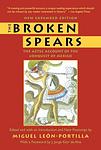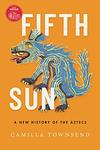The Greatest "History, Mexico" Books of All Time
Click to learn how this list is calculated.
This list represents a comprehensive and trusted collection of the greatest books. Developed through a specialized algorithm, it brings together 300 'best of' book lists to form a definitive guide to the world's most acclaimed books. For those interested in how these books are chosen, additional details can be found on the rankings page.
Genres
The category of "History" in books refers to the study and interpretation of past events, societies, and cultures. It encompasses a wide range of topics, including political, social, economic, and cultural developments, as well as the lives of individuals and groups who have shaped the course of history. History books can be written from various perspectives and may focus on specific time periods, regions, or themes. They aim to provide readers with a deeper understanding of the past and its impact on the present.
The "Mexico" category for books would encompass literature that explores the history, culture, and society of Mexico. This could include works of fiction, non-fiction, and memoirs that delve into the country's rich traditions, political struggles, and diverse communities. From the ancient civilizations of the Aztecs and Mayans to the modern-day challenges facing Mexico, this category would offer readers a glimpse into the complexities and beauty of this vibrant country.
Countries
Date Range
Reading Statistics
Click the button below to see how many of these books you've read!
Download
If you're interested in downloading this list as a CSV file for use in a spreadsheet application, you can easily do so by clicking the button below. Please note that to ensure a manageable file size and faster download, the CSV will include details for only the first 500 books.
Download-
1. Here's to You, Jesusa! by Elena Poniatowska
This novel tells the story of Jesusa, a woman who experiences the Mexican Revolution, the Cristero War, and the development of the Institutional Revolutionary Party. Through her eyes, readers witness the struggles of poverty, the brutality of war, and the realities of a woman's life in early 20th century Mexico. The protagonist's life is filled with hardship, but she remains resilient, embodying the spirit of the Mexican people during a turbulent time in history.
-
2. The True History of the Conquest of New Spain by Bernal Díaz del Castillo
This book provides a first-hand account of the conquest of Mexico by the Spanish during the 16th century. It offers a detailed narrative of the events, battles, and interactions with native tribes, including the Aztecs. The author, a soldier in the Spanish army, provides a unique perspective on Hernán Cortés and his tactics, the politics of the time, and the cultural and religious practices of the indigenous people. The book also highlights the hardships, challenges, and ethical dilemmas faced by the conquistadors.
-
3. My Life by Leon Trotsky
This autobiography provides a detailed account of the life of a prominent Russian revolutionary and Marxist theorist. The book traces his early life, education, and political development, his role in the Russian Revolution and Civil War, his leadership of the Red Army, and his expulsion from the Communist Party and subsequent exile. It offers a unique perspective on key events in 20th-century history and an insight into the author's complex personality and intellectual development.
-
4. The Broken Spears by Miguel Leon-Portilla
"The Broken Spears" presents a poignant account of the Spanish conquest of the Aztec Empire from the perspective of the indigenous people. Through a compilation of Nahuatl texts, the book offers a narrative that contrasts sharply with the traditional European-centered histories. It highlights the devastating effects of Spanish conquest on the Aztec civilization, including the significant cultural and human losses suffered due to violence and disease. The work provides a voice to the Aztec people, showcasing their courage, complexities of their society, and the tragic impact of colonialism.
-
5. Mexico: Biography of Power by Enrique Krauze
This book offers a comprehensive exploration of the political and social evolution of Mexico, tracing the country's history from the pre-Columbian era to the late 20th century. It delves into the lives and legacies of Mexico's influential leaders, examining how their exercise of power shaped the nation's identity and destiny. The narrative weaves through the complexities of Mexico's revolutions, reforms, and relationships with external powers, providing a deep understanding of the forces that have defined the country's path and the characters who have stood at the helm of its journey. Through a blend of biography and historical analysis, the work presents a vivid portrait of a nation's struggle for sovereignty, stability, and self-definition.
-
6. Conquest Of Mexico by Hugh Thomas
"Conquest of Mexico" offers a comprehensive and detailed account of the Spanish conquest of the Aztec Empire, led by Hernán Cortés in the early 16th century. The book delves into the complex interactions between the Spanish conquistadors and the indigenous civilizations, highlighting the military strategies, political maneuvers, and the blend of coercion and diplomacy employed by Cortés. It also explores the profound impact of European arrival on the native cultures, the role of indigenous allies in the conquest, and the aftermath of the fall of Tenochtitlan, providing a nuanced exploration of this pivotal moment in Latin American history.
-
7. Great River: The Rio Grande in North American History by Paul Horgan
This book provides an in-depth historical account of the Rio Grande, one of North America's significant rivers. The narrative is divided into four parts, each representing a different era in the river's history. The author meticulously explores the indigenous cultures that first inhabited its banks, the Spanish conquest, the Mexican-American War, and the modern development of the river. The book is not just about the river itself, but also about the people, cultures, and events that have shaped its course and the region surrounding it.
-
8. Incidents of Travel in Yucatan by John Lloyd
This book is a detailed and intriguing exploration of the Yucatan Peninsula, capturing the author's journey through the region in the 19th century. The narrative provides a comprehensive account of the local Mayan culture, architecture, and archaeological sites, including the ruins of ancient civilizations. The author's keen observations and descriptions bring to life the landscape, flora, fauna, and the everyday life of the people, offering a vivid historical perspective of the Yucatan.
-
9. History Of The Conquest Of Mexico by William H. Prescott
This book provides a detailed historical account of the Spanish conquest of Mexico, primarily focusing on the period from 1519 to 1521. It narrates the dramatic encounters between the Spanish conquistador Hernán Cortés and Aztec emperor Montezuma, set against the backdrop of the complex political and social structures of the Aztec empire. The narrative is enriched with descriptions of the military strategies, pivotal battles, and the eventual downfall of one of the most powerful civilizations in the Americas. Through comprehensive research and vivid storytelling, the book explores the profound impact of European colonization on indigenous cultures and the course of Mexican history.
-
10. Grant by Ron Chernow
"Grant" is a comprehensive biography of the 18th President of the United States, Ulysses S. Grant. Written by Pulitzer Prize-winning author Ron Chernow, the book explores Grant's early life, military career, presidency, and post-presidential years. Chernow portrays Grant as a complex and often misunderstood figure, highlighting his military genius and leadership during the Civil War, as well as his struggles with alcoholism and financial ruin later in life. The book also delves into Grant's relationships with his wife, Julia, and political figures such as Abraham Lincoln and William Tecumseh Sherman. Overall, "Grant" offers a detailed and nuanced portrait of one of America's most significant historical figures.
-
11. T. Rex And The Crater Of Doom by Walter Alvarez
The book delves into the fascinating scientific detective story that led to the discovery of the Chicxulub crater, a massive impact site hidden beneath the Yucatán Peninsula, which provided crucial evidence supporting the theory that the extinction of the dinosaurs was caused by a catastrophic asteroid impact. Geologist Walter Alvarez, along with a team of scientists, unravels the layers of geological evidence, from the worldwide layer of sediment enriched with iridium to the shocked quartz and tektites indicating a violent impact, ultimately piecing together a compelling narrative about the events that led to one of Earth’s most significant mass extinctions.
-
12. The End of the Myth: From the Frontier to the Border Wall in the Mind of America by Greg Grandin
The book explores the concept of the frontier throughout American history, arguing that it has been a central myth that has shaped the nation's ideologies and policies, from its inception to the present day. The author traces this myth from the country's founding, through westward expansion, to the current political climate and the contentious issue of the border wall. The book suggests that the frontier has served as a symbol of freedom and opportunity, but also of conflict and exclusion, reflecting the country's struggle with its own identity and values.
-
13. Fifth Sun by Camilla Townsend
"Fifth Sun" offers a comprehensive history of the Aztecs based on indigenous texts written in the Nahuatl language. The book challenges conventional narratives derived from Spanish sources, presenting an insightful perspective on Aztec life, culture, and politics from the viewpoint of the Aztecs themselves. Through a detailed examination of these native texts, the book reconstructs the rich tapestry of a complex society, exploring its rise, its interactions with neighboring peoples, and its eventual confrontation with the Spanish conquistadors. This work provides a nuanced understanding of the Aztec civilization by highlighting their intellectual achievements, societal norms, and the internal and external challenges they faced.
-
14. The War with Mexico by Justin H. Smith
"The War with Mexico" is a comprehensive historical analysis of the Mexican-American War from 1846-1848. The book delves into the political, social, and military aspects of the war, providing an in-depth account of the events leading up to the war, the battles fought, and the aftermath. The author critically examines the motivations and actions of both sides, offering a detailed and balanced perspective on this significant period in American history.
Reading Statistics
Click the button below to see how many of these books you've read!
Download
If you're interested in downloading this list as a CSV file for use in a spreadsheet application, you can easily do so by clicking the button below. Please note that to ensure a manageable file size and faster download, the CSV will include details for only the first 500 books.
Download












